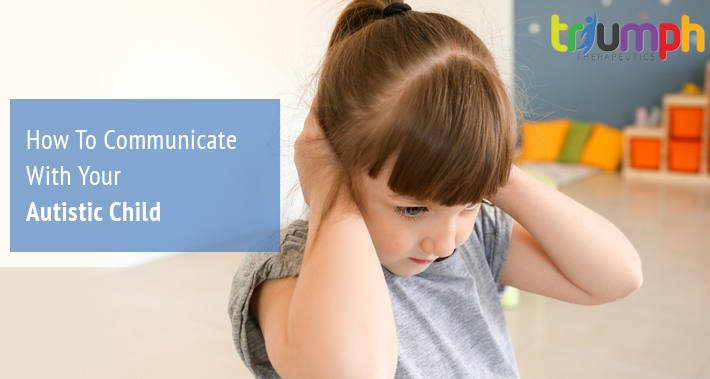How To Communicate With Your Autistic Child
https://www.triumphtherapeutics.com/wp-content/uploads/2021/12/Triumph-Therapeutics-Speech-Therapy-OT-Physical-Therapist-Washington-DC-Dec01-01-2021.jpg 710 379 Triumph Therapeutics Triumph Therapeutics https://www.triumphtherapeutics.com/wp-content/uploads/2021/12/Triumph-Therapeutics-Speech-Therapy-OT-Physical-Therapist-Washington-DC-Dec01-01-2021.jpgYou probably have a picture in your head of what you think autism looks like.
If you haven’t had much experience or interaction with actual autistic people, it might include stereotypes like they are savants, or excellent at math.
Perhaps you think they all need assistance to perform basic tasks, or have trouble keeping a job.
For these reasons, when parents suspect their child may have autism, it can be a scary time, because they’re worried about what this means for their future.
However, autism exists on a spectrum, and while some autistic children may need assistance or care, others are able to live relatively independently of pediatric therapeutic services.
Early access to pediatric speech and language therapy can help autistic children learn communication skills which will help them their whole lives.
In addition, pediatric occupational therapy services can help autistic children develop the motor skills they need to thrive.
As a parent, a diagnosis of autism spectrum disorder for your child can be a scary thing, but it doesn’t have to be.
It just requires an understanding that their brain doesn’t work the same way as other peoples, and the patience to learn the best ways to communicate with them.
Keep reading to learn more ways to communicate with your autistic child.
What Is Autism Spectrum Disorder?
Autism spectrum disorder is a developmental disorder.
It’s a result of differences in the brain which affects the development of communication and social skills.
The term “spectrum” is used because there is a wide range of way this disorder can present
Although there tend to be commonalities, the severity of signs and symptoms will vary from person to person.
In 2016 the Centers for Disease Control estimated approximately one in 54 children in the USA has autism spectrum disorder.
There is no cure for autism, however intervening early with speech therapy and occupational therapy treatments for autism spectrum disorder can make a huge difference in the lives of autistic people, especially if they struggle with communication or motor skills.
Signs Of Autism Spectrum Disorder
Some signs to watch for which could indicate autism spectrum disorder in a child include:
- Avoidance of eye contact
- Doesn’t take interest in their peers
- Trouble related to communication, including speaking and understanding
- Dislike of physical contact
- Reacts to sensory stimuli (feel, sight, taste, sound, and smell) in unusual ways
- Has trouble understanding and responding to social cues
- Unusual or repetitive physical behaviors also called stimming
In addition, these are some developmental milestones which children with autism spectrum disorder may not meet at the same rates as their peers:
- Nine months of age – not responding to their name
- Also at nine months, not showing facial expressions such as happy, sad, or surprised
- Not using gestures (for instance waving) by twelve months
- Inability to play basic games such as pat-a-cake by twelve months of age
- At 18 months, pointing or responding when others point at objects
- By two years of age – doesn’t understand when other people are sad or hurt
- Not “playing pretend” by 30 months
- Difficulty understanding feelings, or talking about their feelings by 36 months
- Doesn’t play games which involve taking turns by 5 years of age
Autism spectrum disorder tends to have some overlap with sensory processing disorder as well, so symptoms of one are often symptoms of the other.
How To Communicate With An Autistic Child
Communication with an autistic child may require a different approach than you’re used to with other individuals.
Let’s have a look at some of the key things to keep in mind, to make communication easier and smoother for both you, and your child.
1. Above All, Be Patient
Autism spectrum disorder can affect how the brain processes information.
One outcome of this is it may take longer for someone with autism to fully take in what you’re saying to them.
You may need to slow down or repeat communications when speaking to autistic individuals, to ensure they have a full grasp of what you’re saying.
2. Use Physical Activity To Communicate
Autism spectrum disorders can have an impact on children’s attention spans.
Using play and exercise can help them to redirect their energy, relax, and feel more at ease.
3. Reward Positive Behavior (And Ignore Negative Behavior)
Part of autism spectrum disorder is an issue with not always reading or understanding social cues.
This can lead to behavior which your child may not easily recognize as being negative.
Children respond to positive reinforcement, and this is especially true for those with autism.
Therefore, be generous with praise of behaviors you want to see repeated, and don’t give extra attention for behaviors which are negative or attention seeking.
4. Be Responsive To their Needs
Every child – autistic or not – has differing needs.
For some, hugs and touch are essential to making them feel comforted and secure, while others will shy away from this.
Pay attention to the needs of your child – offer hugs when they need them, and give them personal space when that’s what they want.
Most importantly, respect their needs and never impose physical affection when it’s unwanted.
5. Learn Not To Take Things Personally
It’s important to remember the behaviors displayed by children with autism spectrum disorder are as a result of how their brain is wired.
They may respond bluntly when spoken to, avoid eye contact, or have trouble controlling emotions.
Although these are all things which can be worked on, for young children they are often beyond their control – it’s important to show them patience and learn to not take these things personally.
Book Your Appointment With Triumph Therapeutics Today
Is your child not developing at the rates you would expect?
Do they shy away from physical contact, or have trouble with eye contact?
Perhaps they’re showing extreme responses to stimuli like lights or loud noises.
If you suspect your child is showing signs of autism spectrum disorder, or has already had a diagnosis, we can help.
We’re Triumph Therapeutics and we offer pediatric speech therapy, pediatric occupational therapy, and pediatric physical therapy in the Washington DC area.
Contact us today to set up an consultation or for more information on our services.


